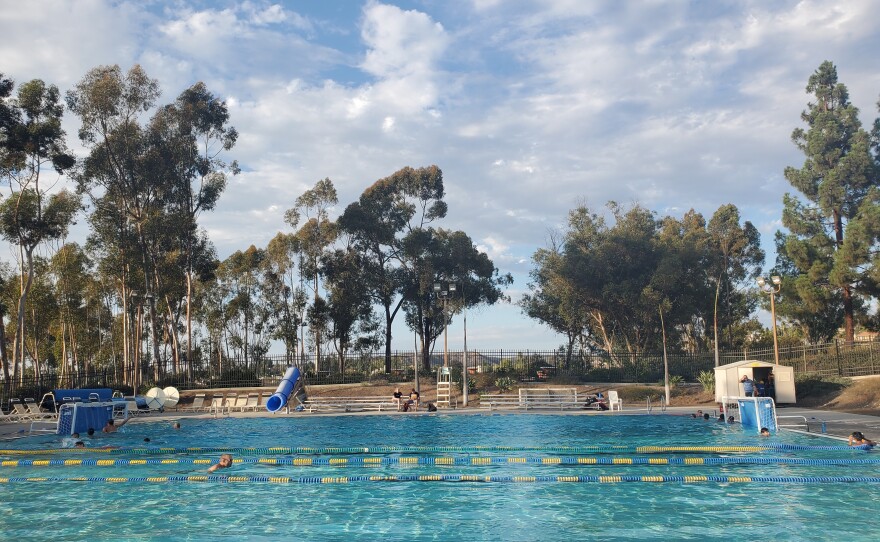It’s past 5 p.m. on a Friday, and Sharon Risoer and her 3-year-old daughter, Clara, are practicing swimming at the Tierrasanta Aquatic Center, a public pool owned by the city of San Diego.
As the temperature dips, Clara’s lips turn a little blue. Her mom knows it’s late in the day for swimming, but they’re fitting it in when they can. That’s because this pool is not open on weekends. It’s open for kids to swim Mondays, Wednesdays and Fridays from 12:30 to 7:30 p.m., so the Risoers are there to swim after school and work.
“Saturday swimming would be great because it's difficult with work schedules and a full schedule to make it to pool sessions that are during the day,” Risoer said.
But across the city, there are hardly any weekend pool hours where kids can swim. And that’s a big cutback from previous years.
The city of San Diego has 13 public pools. In September 2019, all but one of them had weekend recreational swim hours, and the one that didn’t was completely closed. In total across all city pools, there were 50 hours when kids could swim on the weekends.
Pools were mostly closed last summer due to COVID-19. Now, this September, there are just three city pools with weekend recreational swim hours: Clairemont, La Jolla and San Ysidro. Each pool is open for two and-a-half to five hours total each weekend.

Many of the city’s pools ended their kids weekend hours after Labor Day. That despite the fact that September is usually one of the hottest months in San Diego, with higher average temperatures than in June or July. And in previous years, city pools stayed open on weekends in September.
RELATED: Extreme Heat Wave Continues In San Diego Area, Fire Dangers Remain High
Scott Polach recently brought his 4-year-old son, Felix, to the Tierrasanta Aquatic Center on a Saturday. The city’s website said the pool was open, but it wasn’t. It had switched to September hours, but the city hadn’t updated the website.
“I did see a few other families with children come up ready to get in the splash pad,” Polach said. “It’s cruel to kind of be turned around and turned away. I will say there is a level of frustration with it not being open, but more so there's a frustration around the level and lack of communication to where it’s not listed on the website, so that we don't have to waste our time on going there to find out.”
The lack of swimming options is not just frustrating for families, but impacts kids’ health, especially in lower income neighborhoods where there aren’t as many places to exercise, and families can’t afford memberships at private pools, said Noe Crespo, a public health professor at San Diego State University.
“It's an unfortunate scenario that depending on where a child lives then that will determine if they have access to a pool they have access to sports,” he said.

Children of color and children in lower income neighborhoods are less likely to know how to swim, and less likely to be physically active overall, he said. That despite the fact that exercise helps kids physically, and also improves their mental health and performance in school. Cities should be responsible for providing some exercise facilities to their residents, he said.
“Cities are responsible to provide the resources in different locations and to look at also equity, to understand and look at what facilities are mostly used by different groups, including, for example, older adults and children, and to create opportunities so that the community members can have access to those facilities,” he said.
Tim Graham, a spokesperson for the city of San Diego, wouldn’t do an interview about the change in pool hours. But he sent an email saying the change is because the city is short staffed.
“This is actually a nationwide issue not only with pools and lifeguards but with many businesses that utilize young workers to provide services to their customers,” he wrote. “The reality is without the aquatics staff to provide programming and pool guard duties it’s not possible to keep the facilities as open as long as we’d like and provide a safe environment for the public.”
Weekend hours at pools are fully funded in this year's city budget, said Baku Patel, an analyst with the Office of the Independent Budget Analyst. In last year's budget negotiations, there was a proposal to close all pools for 14 weeks from October to March and cut back each pool's hours by three or four hours, likely resulting in Saturday or Sunday closures. That would have saved $358,000, but the cuts didn't end up making it into the budget.
Courtney Pittam, a spokesperson for Mayor Todd Gloria, sent a statement saying the closures were due to staff shortages, and encouraging people to apply to work at city pools. The city pays pool lifeguards minimum wage up to just over $17 an hour.
“Despite (staffing) challenges and in an effort to maintain citywide access, we continue to offer recreational swim access at pools in the northern, central and southern parts of the city," she wrote. “We are diligently working to ramp up staffing and restore hours across these facilities to ensure all San Diegans can continue to access our pools.”
Sharon Risoer, the Tierrasanta resident, is also thinking about costs. Since she can’t go to her local city pool on the weekends, she’s left with buying day passes at private pools, which could cost $60 for her family of four, or joining the YMCA.
“It’s expensive, whereas the city pools, they’re fun and they’ve got great facilities,” she said.
Her daughter, Clara, would especially like to use the splash pad at the Tierrasanta pool. But it’s only open two days a week from 12:30 to 3 p.m., when Clara is in school.







